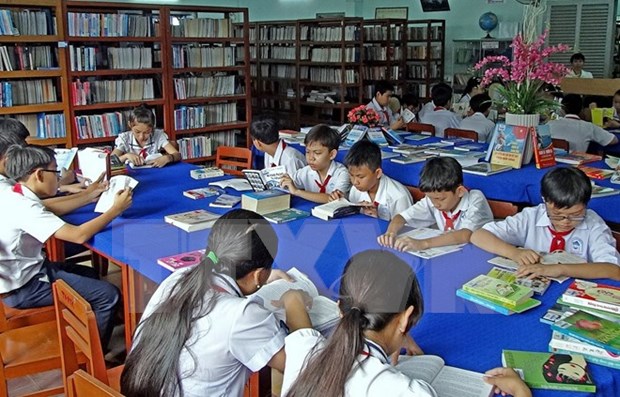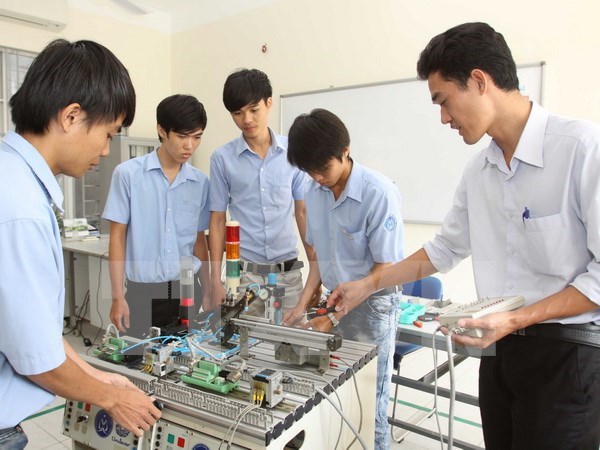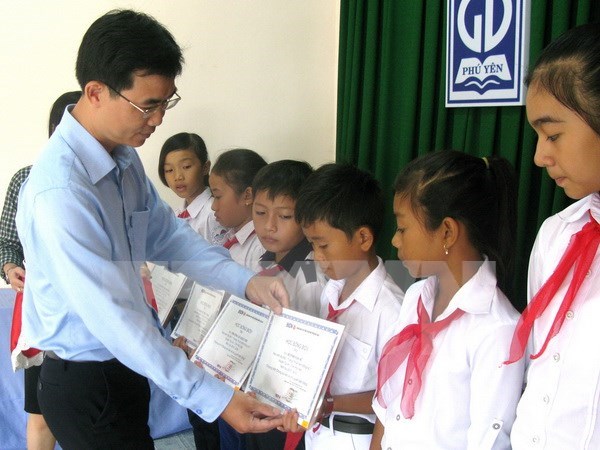Learning society – Vietnam’s development strategy
Life-long learning is indispensable, especially given the rapid technological innovation and longer human longevity.
 Students read books at a library in the Mekong Delta province of Vinh Long (Photo: VNA)
Students read books at a library in the Mekong Delta province of Vinh Long (Photo: VNA)Hanoi (VNA) – Life-long learning is indispensable, especially given the rapid technological innovation and longer human longevity, deputy head of the Ministry of Education and Training’s Department of Continuing Education Nguyen Cong Hinh told the Vietnam News Agency in a recent interview.
Learning should not be confined to childhood or the classroom but take place throughout life and in a range of situations, improving personal knowledge, skills and behaviour.
He said illiteracy is not only the inability to read and write but also a lack of knowledge about science-technology and working skills.
In 2005, the government adopted the learning society strategy until 2010 and has passed its extension to 2020.
The 2012-2020 scheme targets eradicating illiteracy, educational universalisation and distance training, especially for rural workers, retirees, housewives and the disabled in libraries, museums, cultural houses and clubs, to improve their computer, foreign language and professional skills.
To build an educated society with learning at all ages and formal and informal learning, a community-based learning centre (CLCs) model has been piloted in Vietnam since 1997. It has been applied nationwide with about 11,000 CLCs spread across 98.77 percent of all communes and wards, serving tens of millions of people.
Continuing education centres attract learners
 Students at the Hung Vuong vocational school in Ho Chi Minh City (Photo: VNA)
Students at the Hung Vuong vocational school in Ho Chi Minh City (Photo: VNA)Officially established in 1994, the Nguyen Van To Continuing Education Centre in Hanoi’s Hoan Kiem district is one of few continuing education facilities nationwide to organise literacy, elementary, junior and senior classes. There are also poetry, Han-Nom (classical Chinese-Vietnamese ideographic script), calligraphy and Ayurvedic medicine clubs.
Pham Duc Nam, the centre’s Director, said to offer lifelong-learning, the centre has added vocational training to its curriculum, diversified teaching and learning methods and improved the quality of teachers.
The centre has opened classes for people with disabilities, victims of Agent Orange (AO) dioxin in Hanoi and other localities like Bac Ninh, Hai Duong, Hung Yen and Thanh Hoa, as well as homeless children and orphans.
The Thanh Xuan district Continuing Education Centre has 31 classes, including two literacy classes, with about 1,050 total students.
The two literacy classes, based in cultural houses in Thanh Xuan Nam and Kim Giang wards, help children with disabilities and AO victims.
The centre has diversified its teaching and learning methods, timetable and locations to satisfy learners’ demands, said To Thi Tra Ly, the centre’s Director.
Apart from its official curriculum, the centre has offered vocational training, foreign language courses, computer and cooking classes, along with courses aiming to equip students with life skills.
Study encouragement pitches for domestic, foreign assistance
 Scholarships are presented to students with disadvantaged backgrounds and good academic results in Phu Yen province (Photo: VNA)
Scholarships are presented to students with disadvantaged backgrounds and good academic results in Phu Yen province (Photo: VNA)Vice Chairman and Secretary General of the Vietnam Association of Promoting Education (VAPE) Pham Tat Dong said VAPE has raised funds at home and abroad for poor students, citing Germany’s Happel and France’s Odon Vallet scholarships as examples.
Last year, the Vallet Scholarship Fund, established by French Professor Odon Vallet from France's Sorbonne University, set aside 22 billion VND (more than 1 million USD) for 2,250 Vietnamese students this year.
Since its establishment in 2001, the fund has awarded over 120 billion VND (5.5 million USD) to more than 25,000 students.
Thanks to domestic and foreign sponsors, VAPE attracted more than 2.133 trillion VND (96.95 million USD).
Over past years, UNESCO has assisted Vietnam by holding consultation seminars to share experience in building a learning society and supporting CLSs.
Dong said VAPE has also raised public awareness of the learning society. Localities and VAPE chapters issued news bulletins, magazines and websites highlighting learning campaigns.
A week on life-long learning takes place annually in early October while a campaign fostering reading in schools and the community is launched.
The week is themed “Developing reading culture in digital age” and is expected to push forward the application of technology in library activities.-VNA













